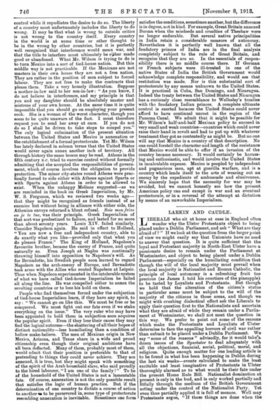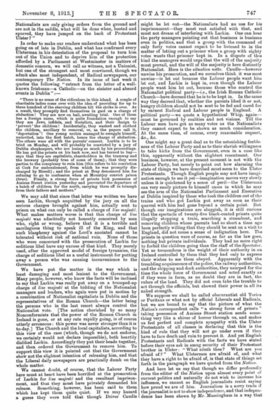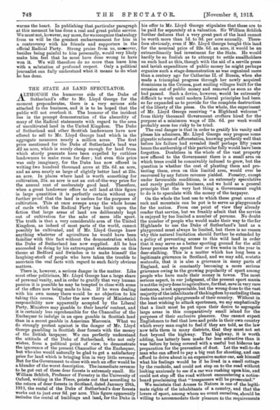LARKIN AND CAUDLE .
. -LIBERALS who sit at home at ease in England often wonder why the Ulster Protestants object to being placed under a Dublin Parliament, and ask" What are they afraid of ? " If we look at the question from the larger point of view we might easily say that Unionists have no need to answer that question. It is quite sufficient that the loyal and Protestant majority in North-East Ulster have a passionate desire to remain under the Parliament at Westminster, and object to being placed under a Dublin Parliament—especially on the humiliating condition that though the will of the local majority must prevail when the local majority is Nationalist and Roman Catholic, the principle of local autonomy is a refreshing fruit too precious (as James I. told his courtiers of the pineapple) to be tasted by Loyalists and Protestants. But though we hold that the alteration of the citizen's status in particular areas must be subject to the will of the majority of the citizens in those areas, and though we might with crushing dialectical effect ask the Liberals to apply their question first to the Nationalists and ascertain what they are afraid of while they remain under a Parliament at Westminster, we shall not meet the question in this way. We prefer to point out some of the reasons which make the Protestants and Loyalists of Ulster determine to face the appalling horrors of civil war rather than submit to be placed under a Dublin Parliament. We say "some of the reasons" advisedly, for it would take:a dozen issues of the Spectator to deal adequately with all the objections, financial, social, political, moral, and religious. Quite enough matter for one leading article is to be found in what has been happening in Dublin during the last six weeks—events calculated to make the least excitable and least imaginative of Protestants in Ulster thoroughly alarmed as to what would be their fate under the present Home Rule Bill. Nationalist domination at present is only in the bud, and is only worked partially and fitfully through the medium of the British Government acting under the control of the Nationalist Party. Yet even thus partially applied it is full of menace. Well may Protestants argue, "If these things are done when the
Nationalists are only giving orders from the ground and are not in the saddle, what will be done when, booted and spurred, they have jumped on the back of Protestant Ulster ? " Li order to make our readers understand what has been going on of late in Dublin, and what has confirmed every Ulsterman in his detestation of the proposal to turn him out of the Union and to deprive him of the protection afforded by a Parliament at Westminster in matters of domestic concern, we will call as witness, not a Unionist, but one of the strongest and most convinced, though we admit also most independent, of Radical newspapers, our contemporary The Nation. In its issue of last week it quotes the following " extract from the letter of a wellknown Irishman—a Catholic—on the sinister and. absurd events in Dublin "
"There is no sense of the ridiculous in this island. A couple of charitable ladies come over with the idea of providing for up to three hundred of the starving children till the strike is over. As a result, they promptly find themselves in gaol on a charge of abduction ! They are now on bail, awaiting trial. One of them has a foreign name, which is quite foundation enough to say they are Jews, infidels, and Socialists, and their design to 'pervert' the children ! Incidentally, they washed and clothed the children, ancillary to removal, or, as the papers call it, 'deportation '! One young urchin managed to smuggle himself, uninvited, into the first batch, hence the charge of abduction. The others were all with the parents' consent. Larkin is to be tried on Monday, and will probably be convicted by a jury of Dublin shopkeepers, who are losing so much by his proceedings. He has got the priests on his back now, and has turned to bay— says that they are capitalists, shareholders in the tramway and the brewery (probably true of some of them) ; that they were parties to the conspiracy to ruin him (this refers to his conviction at Cork for embezzlement, from which he was promptly discharged by Birrell) ; and the priest at Bray denounced him for refusing to go to confession when at Mountjoy convict prison (true). Finally, a strong force of priests took possession of Amiens Street station yesterday and prevented the departure of a batch of children for the north, carrying them off in triumph from their fathers and mothers."
We may add that since that letter was written we have seen Larkin, though acquitted by the jury on all the serious charges brought against him, actually sent to prison on what can only be called a charge of lese majestj. What makes matters worse is that this charge of lese majest6 was admittedly not honestly conceived by men who, right or wrong, believe that it is a terrible and sacrilegious thing to speak ill of the King, and that such blasphemy against the Lord's anointed ° cannot be tolerated without risk of national ruin. None of those who were concerned with the prosecution of Larkin for seditious libel have any excuse of that kind. They merely used, after the approved model of foreign tyrannies, the charge of seditious libel as a useful instrument for putting away a person who was causing inconvenience to the Government.
We have put the matter in the way which is least damaging and most lenient to the Government. Many people, however, who know the facts will be inclined to say that Larkin was really put away on a trumped-up charge of lese majesto at the bidding of the Nationalist managers and leaders, who again were put in motion by a combination of Nationalist capitalists in Dublin and the representatives of the Roman Church—the latter being the persons who in the last resort always control the Nationalist vote. [The notion cherished by so many Nonconformists that the power of the Roman Church in Ireland is gone, or at any rate rapidly going, is of course utterly erroneous : this power was never stronger than it is to-day.] The Church and the local capitalists, according to this view of the case (which, though we do not endorse, we certainly would not declare impossible), both heartily disliked Larkin. Accordingly they put their heads together, and then ordered the Government to remove him. To support this view it is pointed out that the Government show not the slightest intention of releasing him, and that the Liberal daily newspapers are practically dumb on the whole matter. We cannot doubt, of course, that the Labour Party here must at heart have been horrified at the prosecution of Larkin for lese majeste and the resultant imprisonment, and that they must have privately demanded his release. Something, however, has been said to them which has kept them quite quiet. If we may hazard a guess they were told that though Driver Caudle might be let out—the Nationalists had no use for his imprisonment—they must rest satisfied with that, and must not dream of interfering with Larkin. One can hear the party managers pointing out that business is business even in politics, and that a group with the command of only forty votes cannot expect to be listened to in the matter of letting out a prisoner when a group with eighty votes wants that prisoner kept in. In a dispute of this kind the managers would urge that the will of the majority must prevail, and the will of the majority is here distinctly Nationalist. Here is the situation nette. Caudle—however unwise his prosecution, and we ourselves think . it was most unwise—is let out because the Labour people want him let out, and Larkin is kept in, evOn though the Labour
people want him let out, because those who control the Nationalist political party—i.e., the Irish Roman Catholic Church—have decreed that he is to be kept in. In the same way they decreed that, whether the parents liked it or not, hungry children should not be sent to be fed and cared for by earnest Radical and Labour people in England. A political party—we quote a hypothetical Whip, again— must be governed by realities and not visions. Till the Labour men have got as many votes as the Nationalists they cannot expect to be shown as much consideration. At the same time, of course, every reasonable request, &c., &c.
One might say a great deal as to the astonishing feebleness of the Labour Party and as to their slavish willingness to take kicks from the Government, even in a case like this, apparently without the slightest resentment. Our business, however, at the present moment is not with the Labour Party, but merely to point out how alarming the state of things we have described must seem to the Ulster Protestants. Though English people may not have imagination enough to see it yet—imagination moves very slowly unless it is quickened by a sense of peril—the Ulsterman can very easily picture to himself cases in which he may see the arm of the Nationalist Parliament and Executive at Dublin inspired by those who took the children out of the trains and who got Larkin put away as soon as their quarrel with him had gone beyond a certain point. But though our imaginations are sluggish, it is still curious that the spectacle of twenty-five black-coated priests quite illegally stopping a train, searching a steamboat, and removing children whose parents had so short a time ago been perfectly willing that they should be sent on a visit to England, did not rouse a sense of indignation here. The priests in question were of course, as far as the law goes, nothing but private individuals. They had no more right to forbid the children going than the staff of the Spectator. Yet so tremendous is the weight of their authority in an Ireland controlled by them that they had only to express their wishes to see them obeyed. Apparently with the trembling acquiescence of the police, the railway authorities, and the shipping and dock authorities, they usurped for the time the whole force of Government and acted exactly as if they were in form, as no doubt they are in fact, the rulers of the land. They did not even take the trouble to act through the officials, but showed their power in all its naked strength.
We suppose we shall be called obscurantist old Tories or Puritans or what not by official Liberals and Radicals, but we are bound to say that the picture of what the Nation's correspondent calls "a strong force of priests" taking possession of Amiens Street station sends something very like a shiver of horror through us, and makes us feel perfect and complete sympathy with the Ulster Protestants of all classes in declaring that this is the kind of rule that they will not go under even if they have to face death and ruin to prevent it. And yet English Protestants and Radicals with the facts we have stated before their eyes ask in smug security of their Protestant brother in Ulster : "What aileth thee ? What are you afraid of ? " What Ulstermen are afraid of, and what they have a right to be afraid of, is that state of things set forth in the paragraph we have quoted from the Nation. And here let us say that though we differ profoundly from the editor of the Nation upon almost every point of current politics and naturally do not wish to increase his influence, we cannot as English journalists resist saying how proud we are of him. Journalism is a sorry trade if the journalist is not to show independence, and that indepeni dence has been shown by Mr. Massingham n a way that
warms the heart. In publishing that particular paragraph at this moment he has done a real and great public service. We must not, however, say more, for we recognize thateulogy from us will be the greatest embarrassment for him in a controversy with his friends and supporters in the official Radical Party. Strong praise from us, moseover, besides being painful to him personally, would very likely make him feel that he must have done wrong to have won it. We will therefore do no more than leave him with a salutation of profound respect. Only a political journalist can fully understand what it means to do what he has done.




















































 Previous page
Previous page